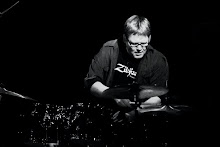When I was in high school, I read an interview with Wynton Marsalis where he said something like, "When you transcribe, you're learning to read a solo more than play it". Now, because I was young, inexperienced, and prone to black and white thinking, this formed my attitude about transcriptions for the next 40 years!
Cue recently, when a pianist/composer friend of mine asked me to transcribe some timekeeping on the drum set for an arrangement she was writing. It happened to be the first chorus of this:
Of course, I love Mickey Roker, especially his playing on this track, but I hadn't listed to his playing on it in detail. This is where transcribing led me to some conclusions that I wouldn't have made UNLESS I was listening to it multiple times in a row AND was able to look at it! Hence, the advantage of transcribing. :) I might post it here at some point, but I actually believe the actual act of transcribing is where the transcribee learns the most. Case in point, Roker plays a lot of ride rhythm without the skip beat. He certainly doesn't play just quarter notes on his cymbal, but he is judicious about where he plays the +s in the rhythm, using it to decorate rather than dominate. This led me to realize that a lot of my work on independent coordination had become somewhat of a trap. When one works on something a lot, the opposite thing gets increasingly more challenging. For example, try playing the standard ride rhythm and sometimes DON'T play the cymbal on 2 & 4. Conceptually easy, but there's a lot of muscle memory to get past! :) So, I started working on some "dependent coordination" ideas. I didn't write them out because these will work on any beats you know well.
Take any standard beat and….
1) Never allow a quadruple stop. (4 limbs playing at the same time).
2) " " " a triple stop. (3 limbs).
3) " " " Double stop. (2. At this point, you have become a saxophone player!)
Mix and match which limbs/parts of the kit become "immutable" and will always sound when you're making a choice of which combinations to play and what to leave out.
There are tons of examples of this we already play. For instance, in the Charlie Watts beat, the snare/LH on 2 & 4 is more important than the hi-hat/RH, hence the snare alone on those beats.
Have fun and experiment with it. I guarantee it'll kick your butt a bit and get you thinking about why you orchestrate things the way you do. :)

No comments:
Post a Comment